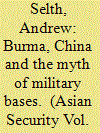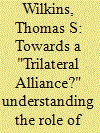| Srl | Item |
| 1 |
ID:
080960


|
|
|
|
|
| Publication |
2007.
|
| Summary/Abstract |
Since the advent of a new, more outward-looking military government in 1988, Burma has come to occupy a position of considerable importance in the Asia-Pacific strategic environment. Burma's burgeoning relationship with China has attracted particular attention, not least because of the stream of reports in the news media and, to a lesser extent, academic literature, claiming that China has established several naval bases and intelligence collection stations in Burma. This apparent intrusion by China into the northeast Indian Ocean has strongly influenced the strategic perceptions and policies of Burma's regional neighbors, notably India. The reported facilities have also been cited as evidence that Burma has become a client state of China, and as proof of Beijing's expansionist designs in South and Southeast Asia. A close examination of the available evidence, however, suggests that there are no Chinese military bases on Burmese soil, a fact conceded by senior Indian officials in 2005. China still has a strong strategic interest in developing its bilateral relations with Burma but, based on this analysis, it would appear that China's presence in Burma, and its current influence over Burma's military regime, have been greatly exaggerated.
|
|
|
|
|
|
|
|
|
|
|
|
|
|
|
|
| 2 |
ID:
080957


|
|
|
|
|
| Publication |
2008.
|
| Summary/Abstract |
Since the Democratic Progressive Party's stunning victory in the 2000 presidential election, Chen Shui-bian has accelerated the process of creating an officer corps without strong party inclination toward the KMT. What is the impact of Taiwan's democratization on its civil-military relations? What is the prospect of transitioning from a party-army to a "national army"? Will the DPP's zealous advocacy for Taiwan's independence be incompatible with the military's long-held belief in "China-centered" nationalism, straining relations between the military and the new administration? The analyses, implications, and conclusions of this study will shed light on the general role of the military in Taiwan's democratic transition and consolidation
|
|
|
|
|
|
|
|
|
|
|
|
|
|
|
|
| 3 |
ID:
080956


|
|
|
|
|
| Publication |
2007.
|
| Summary/Abstract |
This article focuses on the challenge of implementing the UN Global Counter-Terrorism Strategy in the Asia-Pacific region. The article starts with an analysis of the Strategy itself and then examines the nature of the threat facing areas within such a vast and diverse region. It then turns to the roles that relevant regional and sub-regional bodies and the different parts of the UN system can play in strengthening implementation. It also examines how the Strategy might be a vehicle for creating a more coherent regional response to the terrorist threat.
|
|
|
|
|
|
|
|
|
|
|
|
|
|
|
|
| 4 |
ID:
080958


|
|
|
|
|
| Publication |
2007.
|
| Summary/Abstract |
The Philippine approach to the anti-communist insurgency after 1986 has featured peace talks with the rebels, amnesty and livelihood packages, and strengthened security forces. While the military has remained central to the counterinsurgency campaign, the government has also institutionalized police involvement in conducting operations and requested input from local civilian authorities in paramilitary recruitment and human rights monitoring. Legal restrictions against human rights violations by soldiers were also established. The experience of 20 frontline communities in central Philippines reflects these changes. Local civil-military interaction has moved from confrontation to consultation and accommodation. However, tension remains because the military and civilian leaders disagree on the gravity of the insurgent threat
|
|
|
|
|
|
|
|
|
|
|
|
|
|
|
|
| 5 |
ID:
080959


|
|
|
|
|
| Publication |
2007.
|
| Summary/Abstract |
The emerging US-Japan-Australia trilateral alignment is representative of a new archetype of "alliance" calibrated to the changed post-Cold War, post-9/11 security environment. This article considers how we might account for this new alliance formation and how we might conceptualize it. To accomplish this the article formulates an "intra-alliance politics" framework for analysis that juxtaposes competing "Realist" and "Pluralist" images of allied behavior in International Relations theory. This framework is then employed to uncover the motivations and behavioral dynamics driving the trilateral alliance seeking to reveal whether the alignment is predicated upon common "values" or sheer "expediency." It concludes that though the two different International Relations schools offer ostensibly competitive interpretations, the evidence suggests that they are in many ways complementary and mutually reinforcing. We must therefore consider the trilateral alliance an amalgam of both "expediency" and "values." The application of the intra-alliance politics framework expounded here thus enhances our understanding of this particular "alliance" and the phenomenon of "alignment" in genera
|
|
|
|
|
|
|
|
|
|
|
|
|
|
|
|